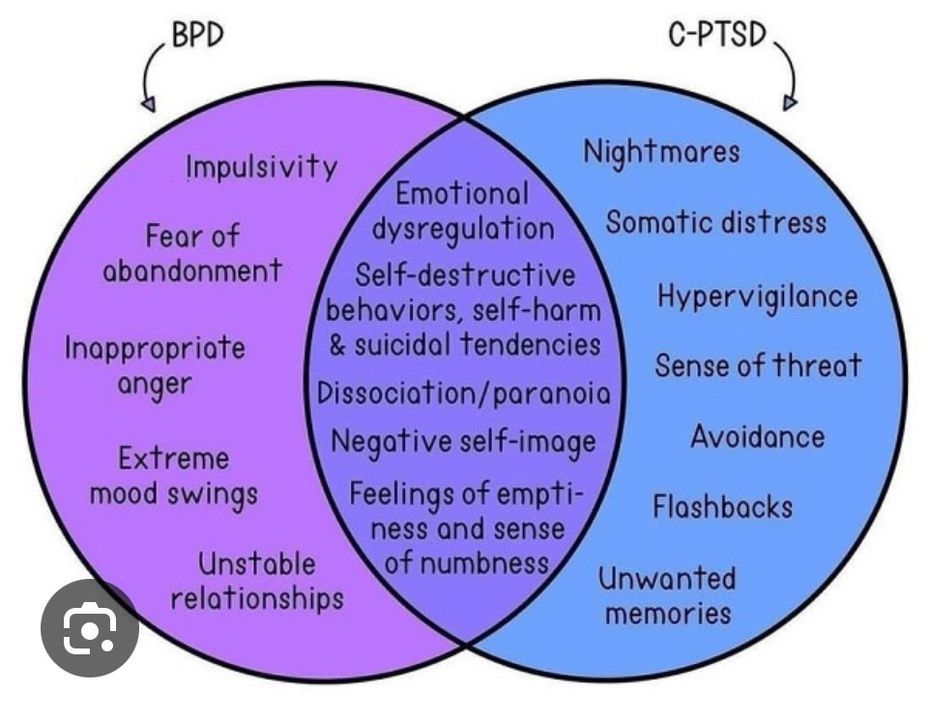BPD and CPTSD #BPD #CPTSD #Childhoodtrauma #DBT #traumaprocessing #Hypervigilence #selfsabotage #trustissues #traumaresponse
I have been doing a lot of thinking lately about unprocessed trauma, and how it impacts everyday life. It determines much of how a person views their relationships, self, and how they respond to stress and fear. I was diagnosed with BPD (Borderline Personality Disorder) in 2017, and it was always very clear to me that many of my symptoms were directly related to trauma I experienced during childhood. Most of this trauma took place from ages 13-19, during an abusive relationship that started my freshman year of high school, and did not end fully end until 2019. Now, five years later, I am trying to unpack the trauma from this time period that I have been pushing to the back of my mind and attempting to avoid for so long.
I cant avoid it because it still frames many of my relationships (both with friends and my spouse). In times of stress and big life changes, I find myself on guard, treating others and myself with coldness and mistrust. My spouse is traveling for work frequently, so I am spending more time alone. I am struggling to maintain motivation and focus both at home and at work, and am often irritable. I become very negative, both towards daily life and myself. I over analyze everything my spouse says to me or doesn’t say to me, and I find myself complaining about almost everything, and feeling guilty about it and realizing that everything in life is good right now, so why am I having such a hard time accepting it? Why do I always have to find something wrong? Why is normalcy so uncomfortable for me?
In taking a hard look at my behavioral patterns, I noticed that many of my reactions to things and interpretations of other’s actions are the same or similar to those I had during the abusive relationship in my teen years. I started to wonder if this was connected, and if there was anything I could do to retrain my mind to not exist in the “trauma realm”. BPD is often diagnosed in individuals who have endured some kind of physical or emotional trauma. The trauma is usually long-term, and it warps how a person sees themself and interacts with the world. It is treatable and is a disorder that can be remedied through retraining the brain to respond differently, interpret differently, and cope differently.
Recently, a new diagnosis has emerged, CPTSD, Complex Post Traumatic Stress Disorder. This disorder shares many symptoms with BPD, and is different from PTSD in that it relates to damage from long-term trauma and not one singular traumatic event or experience. I discovered this new diagnosis while researching trauma response in relationships. (It has been excluded from the DSM-5 thus far). There have been mixed feelings and opinions from the psychological community at large as to the significance of this new diagnosis, and some resistance due to the symptom overlap between CPTSD and other disorders. One of the biggest areas of contention has been the overlap between CPTSD and BPD. In the image I shared, the overlap in symptoms can be seen.
I wanted to reach out to the community here, and ask for thoughts regarding the overlap between BPD and CPTSD, and also ask for advice in the way of overcoming long-term trauma. What are your thoughts on CPTSD, and how should it be interpreted by those who have received a BPD diagnosis? What methods of treatment or small actions have been helpful for you (or your patients) as it relates to trauma responses and being able to recognize them? Has anyone else struggled with long term trauma lasting multiple years, and adjusting to “normal” life on the other side?
I also wanted to ask for thought and feedback regarding unprocessed trauma, and how processing past trauma in a healthy way might have helped you (or a patient)? What steps were taken to process the trauma? What connections were established or discovered between the trauma and behavioral responses to triggers? How were these responses redirected or altered, thus diminishing the “trauma realm” response and shifting to a more mindful and present(in the now)-focused response?
All thoughts and feedback is appreciated!

